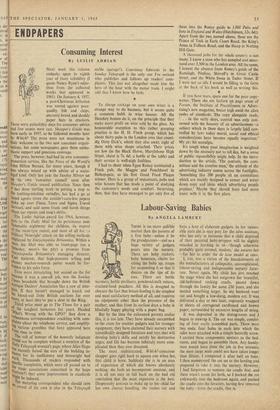ENDPAPERS
Consuming Interest
By LESLIE ADRIAN The press, however, had had its own consumer- Protection service, like the News of the World's John Hilton Bureau, for many years, though it was • always mixed up with advice of a socio- legal kind. Only last year the Sunday Mirror set tin its - own `consumer council' soon after liopper's Guide ceased publication. Since then it has done sterling work' in putting a stop to the knitting-machine swindles, has had a go at leaved agents (even the couldn't-care-less papers Woke up over Fiesta Tours and Sigma Travel Service), and said . some frank and harsh things about car repairs and men's shirts.
The Leslie Adrian .award for .1964, however,
floes to the Daily Mail for its persistence over flammable nightwear for children, its expos6 of the recut-tyre racket, and most of all for i:s brilliant `Newsight' attack on the selling methods en1Ployed by Encyclopedia Britannica. Within a ,Week the Mail was able to front-page (on a ',„aturday, more's the pity) a promise from Kurt Britannica's managing director, :`,Urt Swinton, that high-pressure selling and ,Paoney market-research patter would be for- hidden to his sales force.
because more devastating, but second on the list .,,l'ecause it was a one-off job, was the Sunday
'lines broadside that brought down the British Antique Dealers' Association like a row of nine- „Kits. If they haven't managed to knock out the knock-out from British auctions for ever more, at least they've put a dent in the Ring.
Third prize must go to The Times for a pair of the toughest turnovers for years. Headed What's Wrong with the GPO?' they drew a voluminous correspondence crackling with corn- 14a1nts about the telephone service, and amplify- frig 'various grumbles that have appeared here r°111 time to time. ,. The roll of honour of the honestly indignant ;0111d not be complete without a mention of the dally Telegraph woman's page, where Alice Hope as recently boxed the ears of the building in- wilatrY for its inefficiency and downright bad s °rk• Thousands of readers responded with
the' complaints, which were all passed on to
if!' trade associations concerned in the hope (forlorn?) that some improvement in standards "Rht be induced. The motoring correspondent who should earn a
" award of his own is also in the Telegraph stable (garage?). Courtenay Edwards in the Sunday Telegraph is the only one I've noticed who publishes and follows up readers' com- plaints. This has not altogether made him the hero of the hour with the motor trade. I might add that I know how he feels.
To charge corkage on your own wines is a strange way to do business, but it seems quite a common habit in wine houses. All the Henekey houses do it, on the principle that they make more profit on wine sold by the glass. An honourable exception to this rather grasping practice is the H. H. Finch group, which has about thirty pubs in the London area (not count- ing Dirty Dick's, which they also own), eight of them with wine shops attached. Their prices are low (in the Black Horse, Marylebone High Street, claret is 7s. 6d. a bottle at the table) and their service is well-nigh faultless.
I had to cheer when Egon Ronay nominated a Finch pub, the Magpie and Punchbowl in Bishopsgate, as his first Good Food Plaque winner. Here is a group of restaurants, pubs and wine houses that has made a point of studying the customer's needs and comfort. Surprising, then, that they have managed to get only five of
these into the Ronay guide to 1,000 Pubs and Inns in England and Wales (Hutchinson, 12s. 6d.). Apart from the two named above, these are the Prince of Teck in Earls Court Road, the King's Arms in Fulham Road, and the Hoop in Notting Hill Gate.
A thousand pubs for the whole country is not many. I know a man who has sampled and rnno- tated over 3,500 in the London area. All the same, I lament the absence from Ronay's guide of the Ranelagh, Pimlico, Shirreff's in Great Castle Street, and the White Swan in Tudor Street. If I were not so idle I would be filling in the form at the back of his book as well as writing this.
* If you have tears, spare one for the poor copy- writer. There she sits forlorn on page seven of Forum, the Institute of Practitioners in Adver- tising's new magazine, breast high amid the alien codes of standards. The copy alongside reads, . . in the early days, control was only con- cerned with the honesty of an advertisement—a subject which in these days is largely [sic] con- trolled by law; today moral, social and ethical considerations have become equally important. My sic; his nostalgia.
It's tough when your imagination is weighted down by the necessity not to tell lies, but a sense of public reponsibility might help. In the intro- duction to the article, 'The controls, the com- mittees and the creative man,' the attitude of the advertising industry comes across the footlights. 'Something like 200 people sit on committees which are mainly designed to censor and water down copy and ideas which advertising people produce.' Maybe they should have had more water with it in the first place.






























 Previous page
Previous page